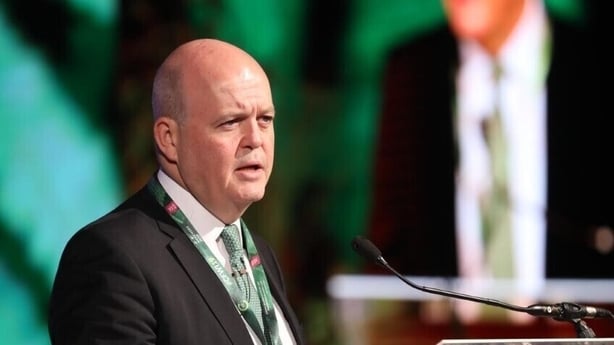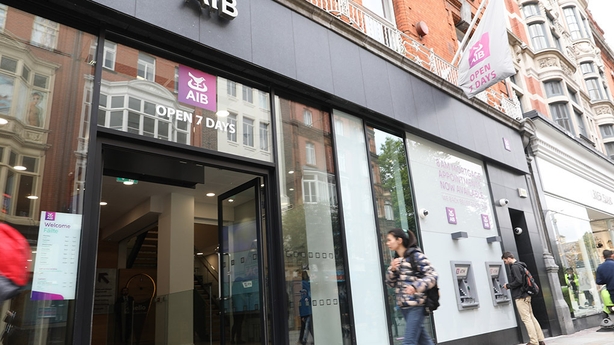AIB has reported profits after tax of €765m for 2022, up from €645m the previous year.
The bank also followed its main rival Bank of Ireland in increasing its returns to shareholders and said a good start to 2023 with positive income momentum left it well on track to deliver its medium-term targets.
The country's largest mortgage lender said it will return €381m to shareholders this year mostly through share buybacks, up from €213m in 2021
AIB's total income for the year to the end of December increased by 21% to €2.895 billion as new lending increased by 22% to €12.6 billion.
Operating profit at the bank came in at €1.081 billion and it said its costs for the year increased by 8% to €1.66 billion.
The bank, which is 57% state owned, noted that its "green" lending jumped by 65% to €3.3 billion to represent 26% of its total new lending.
Its net interest income rose by 20% to €2.159 billion from €1.794 billion in 2021 on the back of a strong fourth quarter.
The bank said the impact of a rising interest rate environment and higher average loan volumes were the main drivers for the increase.
It said it booked an impairment charge of €316m in the second half of last year. That followed a writeback of €309m from Covid-related bad loan provisions in the first half of the year.
The lender said it opened about 450,000 bank accounts during the year, a 76% increase on the previous year as Ulster Bank and KBC Bank Ireland customers move to new banks ahead of their departure from the Irish market.
It said that €2.1 billion of Ulster Bank corporate and commercial loans were transferred to the bank by December, with the remaining loans set to largely complete by the first half of this year.
Approval from the Competition and Consumer Protection Commission for its deal to buy about €5.7 billion of Ulster Bank's performing tracker mortgage portfolio was also received in January of this year.
AIB had said in December that it expects to reach a more than 13% return on tangible equity (ROTE) by 2024 compared to 9.6% last year.
This will allow it to supplement increased dividend payments with share buybacks over that time.

Having upgraded its forecast for net interest income (NII) twice in the second half of 2022 to reflect the faster pace of European Central Bank interest rate hikes, AIB said today that it ended up 20% higher year-on-year at €2.2 billion.
It forecast a further jump above €3 billion this year with customer loans also expected to grow by more than 8%, partly reflecting the completion of large loan book acquisitions from Ulster Bank.
AIB's chief executive Colin Hunt said that 2022 was an eventful year as the impact of the Covid-19 pandemic receded, geopolitical uncertainty increased and cost of living pressures emerged amid rising interest rates.
We need your consent to load this rte-player contentWe use rte-player to manage extra content that can set cookies on your device and collect data about your activity. Please review their details and accept them to load the content.Manage Preferences
"Despite high levels of volatility in the global environment, the Irish economy performed well and remains on track to record further growth in 2023," he noted.
"Against this background, AIB was steadfast in implementing its strategy to grow the Group as we surpassed the three million customer mark, progressed our inorganic initiatives with €2.1 billion of Ulster Bank loans now migrated to AIB and expanded our customer product suite," Mr Hunt said.
"Having announced our medium-term targets in December 2022 and with a strong start to 2023, we are well on track to generate shareholder value and deliver sustainable returns in the interests of all our stakeholders," he added.
Analysts at Davy Stockbrokers said the guidance pointed to significant upside to consensus expectations and indicates that AIB should comfortably exceed its 2024 ROTE target a year early in 2023.
Bank taking 'considered approach' to rate hikes
Colin Hunt told RTÉ News that the performance of the bank was very much reflective of the strong performance of the Irish economy last year with new lending up by over a fifth.
It was also reflective of the rising interest rate environment with net interest income up over 20% last year.
The European Central bank is expected to increase rates by another half a percentage point next week.
Mr Hunt said the bank had taken a "considered approach" to ECB rate increases introduced so far and it would do so again next week.
"When that happens, if that happens, we will consider our response in the same measured way that we responded to all of the rate increases that have been introduced since July," he said.
He wouldn't speculate on where ECB rates will peak.
But he expressed the view that we have seen more increases than might have been expected six months ago, with ECB rates likely to go higher from here.
"We are probably going to be dealing with rates being higher for longer than would have been envisaged even a few months ago," Mr Hunt said.
On the issue of when the full rate increases to date would be passed on to deposit holders, Mr Hunt said every change in ECB policy leads to a careful and measured approach within the bank to how it responds.
He said there hasn't been anything like full pass through of the rate increases to date to either side of the balance sheet, which has been a very deliberate approach on AIB’s part.
He added if there are further rate adjustments they will be considered and responded to in the same way as the previous ECB decisions.
Mr Hunt said the bank had made a net impairment provision of €7m which included a writeback of Covid related provisions, but also a new provision of €316m for future possible bad loans arising from the cost of living squeeze.
"That wasn't driven by an actual credit experience. It was driven by our expectation of the evolution of the economy. It takes into account higher inflation and the impact of higher interest rates on the economy," he explained.
In relation to forward risks, Mr Hunt said the Ukraine war remains the most pressing, but the adjustment of consumers to higher energy costs and the higher cost of living are issues too.

But he added that labour market momentum remains strong and the prospect of reduced tension between the UK and EU over Brexit is something of a relief.
He said the bank is not seeing strain among particular customer segments or cohorts yet, but continues to monitor the situation very closely.
Colin Hunt said he noted the commentary surrounding the recent debt write down that an individual had received from the bank.
He said he wished to assure the public that all customers in financial distress were treated in the same fair and consistent manner by AIB.
"Where customers are in difficulty, we offer a range of supports based on their financial position. Fairness and consistency is at the heart of our procedures," he said.
"There are no special rules, no special treatments, no special cases," he explained.
"Our strong preference is to offer solutions through customer engagements and we have done that in over 150,000 cases," he added.
The bank also announced today that it will be updating its remuneration policy to outline its intentions to provide healthcare benefits and a profit-sharing scheme.
Mr Hunt said AIB's headcount had increased over the past year as it increased its capacity to open new accounts for customers.
He said there is an ongoing operational efficiency programme in the bank and it is likely that headcount will reduce into the back end of next year through short-term contracts not being renewed, retirements and natural attrition.
Mr Hunt said there had been a significant increase in temporary headcount in order to allow it to onboard the 450,000 new customer accounts.
"I don't expect our headcount to go higher from here, in fact I would expect that in the normal course our headcount will reduce as we move through this year and into 2024," he said.
Shares in the bank were lower in Dublin trade today.

